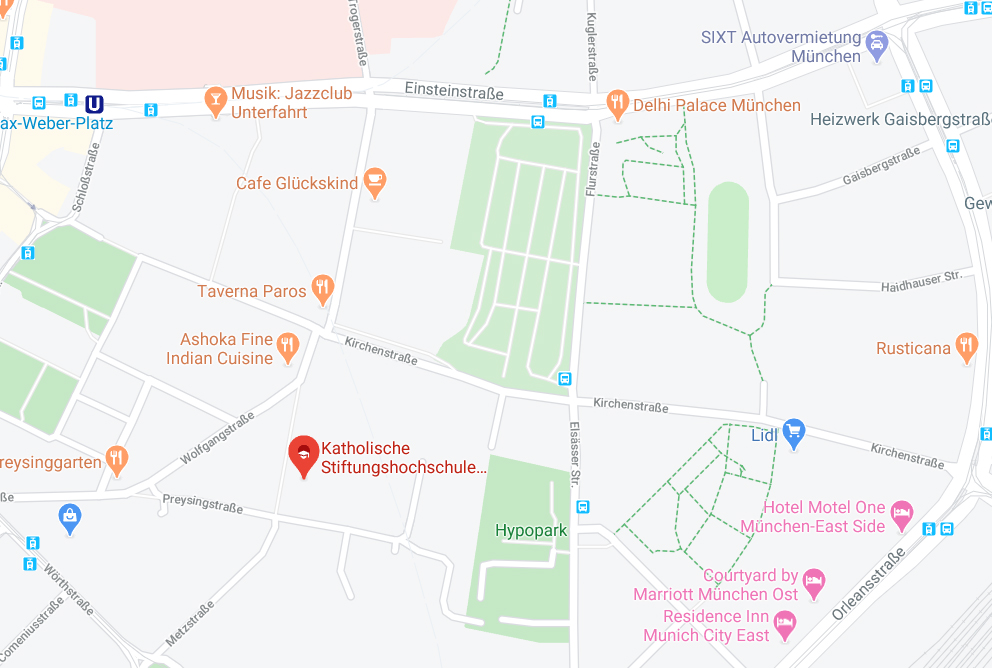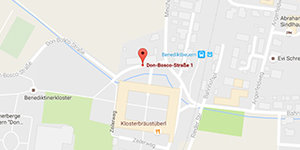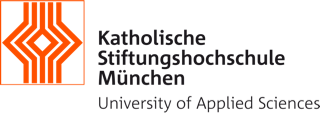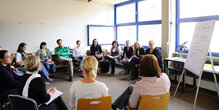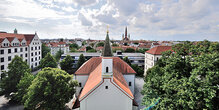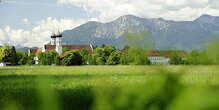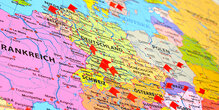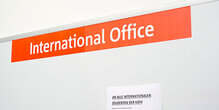The IF: an institute for highly qualified advanced and further training
The Institute for Advanced and Further Training (IF) is an established institute for further training specialising in the areas of social work, (early) childhood education and upbringing, religious education and nursing. It operates across the university's campuses and offers advanced and further academic training as well as postgraduate degree programmes run in parallel to work. In doing so, it attaches great importance to links with real life practice and an academic focus: conferences, congresses and seminars are conducted in close cooperation with sponsors from social work, nursing and healthcare professions. Guest speakers and lecturers from teaching, academia and the industry are distinguished by their relevant expertise and form part of a solid network of collaboration partners and speakers set up by the IF to guarantee a high standard of quality.
The IF’s advanced and further training programmes: being and staying up-to-date
It is said that in the era of lifelong learning there is no time to stand still. This is why the IF always starts by offering comprehensive advice on professional advanced and further qualifications or specialisations. The IF’s portfolio covers a multi-layered range of subjects and programmes in the areas of social work, (early) childhood education and upbringing, nursing and religious education, including training in supervision, which was established many years ago and is recognised by the German Association for Supervision and Coaching (DGSv). Close cooperation with partners and sponsors from various fields of industry forms a key building block to ensuring quality assurance. Academically trained teaching staff from universities, industry, other scientific and academic institutions as well as advisory councils promote dynamism in the post-graduate sector.
> PDF file IF-program 2020 (german language)
Postgraduate degree programmes: always linked to real life practice
The postgraduate degree programmes run in parallel to work are suitable for skilled social workers interested in further academic qualifications. The IF’s degree programmes include detailed advice and close supervision by the institute’s programme leaders or research associates before, during and after the degree. The postgraduate degree programmes are designed with solid foundations in theory/practice, which also makes them more likely to be successfully interlinked with professional life.
Institute Council
The IF is supported by the Institute Council. It advises on developments in advanced and further training opportunities, on networks and collaboration partners in further training and on knowledge transfer into industry.
Chairperson:
Prof. Dr. Daniel Flemming
Deputy Chairperson:
Prof. Dr. Andrea Dischler
Members:
Rupert Brenninger
Prof. Dr. Andrea Dischler
Prof. Dr. Daniel Flemming
Dr. Barbara Haslbeck
Clauia Hauck
Prof. Dr. Sabine Pankofer
Dr. Liane Pluto
Prof. Dr. Birgit Schaufler
Sebastian-Manuel Schmidt
Prof. Dr. Dorit Sing
Gabriele Stark-Angermeier
Tobias Utters
Deputy Ministerial Director Werner Zwick
The IF: an institute for highly qualified advanced and further training
The Institute for Advanced and Further Training (IF) is an established institute for further training specialising in the areas of social work, (early) childhood education and upbringing, religious education and nursing. It operates across the university's campuses and offers advanced and further academic training as well as postgraduate degree programmes run in parallel to work. In doing so, it attaches great importance to links with real life practice and an academic focus: conferences, congresses and seminars are conducted in close cooperation with sponsors from social work, nursing and healthcare professions. Guest speakers and lecturers from teaching, academia and the industry are distinguished by their relevant expertise and form part of a solid network of collaboration partners and speakers set up by the IF to guarantee a high standard of quality.
The IF’s advanced and further training programmes: being and staying up-to-date
It is said that in the era of lifelong learning there is no time to stand still. This is why the IF always starts by offering comprehensive advice on professional advanced and further qualifications or specialisations. The IF’s portfolio covers a multi-layered range of subjects and programmes in the areas of social work, (early) childhood education and upbringing, nursing and religious education, including training in supervision, which was established many years ago and is recognised by the German Association for Supervision and Coaching (DGSv). Close cooperation with partners and sponsors from various fields of industry forms a key building block to ensuring quality assurance. Academically trained teaching staff from universities, industry, other scientific and academic institutions as well as advisory councils promote dynamism in the post-graduate sector.
> PDF file IF-program 2020 (german language)
Postgraduate degree programmes: always linked to real life practice
The postgraduate degree programmes run in parallel to work are suitable for skilled social workers interested in further academic qualifications. The IF’s degree programmes include detailed advice and close supervision by the institute’s programme leaders or research associates before, during and after the degree. The postgraduate degree programmes are designed with solid foundations in theory/practice, which also makes them more likely to be successfully interlinked with professional life.
Institute Council
The IF is supported by the Institute Council. It advises on developments in advanced and further training opportunities, on networks and collaboration partners in further training and on knowledge transfer into industry.
Chairperson:
Prof. Dr. Daniel Flemming
Deputy Chairperson:
Prof. Dr. Andrea Dischler
Members:
Rupert Brenninger
Prof. Dr. Andrea Dischler
Prof. Dr. Daniel Flemming
Dr. Barbara Haslbeck
Clauia Hauck
Prof. Dr. Sabine Pankofer
Dr. Liane Pluto
Prof. Dr. Birgit Schaufler
Sebastian-Manuel Schmidt
Prof. Dr. Dorit Sing
Gabriele Stark-Angermeier
Tobias Utters
Deputy Ministerial Director Werner Zwick
